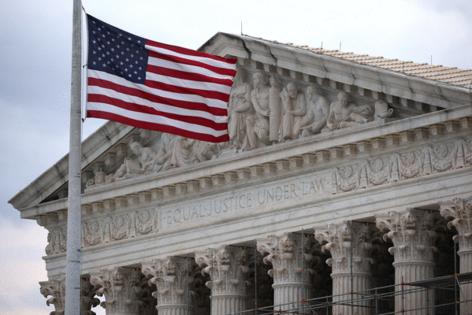Supreme Court to decide if federal law bars transgender athletes from women's teams
Published in Political News
WASHINGTON — The Supreme Court agreed Thursday to weigh in on the growing controversy over transgender athletes and decide if federal law bars transgender girls from women's school sports teams.
"Biological boys should not compete on girls' athletics teams," West Virginia's attorney general said in an appeal the court voted to hear.
The appeal had the backing of 26 other Republican-led states as well as President Donald Trump.
In recent weeks, Trump threatened to cut off education funds to California because a transgender athlete participated in a women's track and field competition.
Four years ago, West Virginia adopted its Save Women's Sports Act, but the measure has been blocked as discriminatory by the 4th Circuit Court in a 2-1 decision.
Idaho filed a similar appeal after its law was blocked by the 9th Circuit Court in San Francisco. The court said it would hear that case together with the West Virginia case.
At issue is the meaning of Title IX, the federal education law that has been credited with opening the door for the vast expansion of women's sports. Schools and colleges were told they must give girls equal opportunities in athletics by providing them with separate sports teams.
In the last decade, however, states and their schools divided on the question of who can participate on girls' teams. Is it only those who were girls at birth or can it also include those whose gender identity is female?
West Virginia told the court its "legislature concluded that biological boys should compete on boys' and co-ed teams but not girls' teams. This separation made sense, the legislature found, because of the 'inherent physical differences between biological males and biological females'."
California and most Democratic states allow transgender girls to compete in sports competitions for women.
In 2013, the Legislature said a student "shall be permitted to participate in sex-segregated school programs and activities, including athletic teams and competitions ... consistent with his or her gender identity."
The Supreme Court had put off a decision on this issue while the divide among the states grew.
Two years ago, the justices turned down a fast-track appeal from West Virginia's lawyers on a 7-2 vote and allowed a 12-year-old transgender girl to run on the girls' cross-country team.
Becky Pepper-Jackson and her mother sued after the school principal said she was barred by the state's law from competing on the girls' teams at her middle school in Bridgeport, W.Va.
She "has lived as a girl in all aspects of her life for years and receives puberty-delaying treatment and estrogen hormone therapy, so has not experienced (and will not experience) endogenous puberty," her mother said in support of their lawsuit.
ACLU lawyers said then the court should stand aside. They said B.P.J. was eager to participate in sports but was "too slow to compete in the track events" on the girls' team.
Last year, West Virginia tried again and urged the Supreme Court to review the 4th Circuit's decision and uphold its restrictions on transgender athletes.
The state attorneys also said the would-be middle school athlete had become a track star.
"This spring, B.P.J. placed top three in every track event B.P.J. competed in, winning most. B.P.J. beat over 100 girls, displacing them over 250 times while denying multiple girls spots and medals in the conference championship. B.P.J. won the shot put by more than three feet while placing second in discus," they told the court.
Last year, the court opted to rule first in a Tennessee case to decide if states may prohibit puberty blockers, hormones and other medical treatments for young teens who are diagnosed with gender dysphoria.
On June 18, the court's conservative majority said state lawmakers had the authority to restrict medical treatments for adolescents who were diagnosed with gender dysphoria, noting the ongoing debate over the long-term risks and benefits. The ruling turned aside the contention that the law reflected unconstitutional sex discrimination.
On Thursday, the justices released their final orders list before their summer recess granting review of new cases to be heard in the fall. Included were the cases of West Virginia vs. B.P.J. and Little vs. Hecox.
In response to the appeals, ACLU lawyers accused West Virginia of seeking to "create a false sense of national emergency" based on a legal "challenge by one transgender girl."
The lawsuit said the state measure was "part of a concerted nationwide effort to target transgender youth for unequal treatment." The suit contended the law violated Title IX and was unconstitutional because it discriminated against student athletes based on their gender identity.
West Virginia's lawyers saw a threat to Title IX and women's sports.
They said the rulings upholding transgender rights "took a law designed to ensure meaningful competitive opportunities for women and girls — based on biological differences — and fashioned it into a lever for males to force their way onto girls' sports teams based on identity, destroying the very opportunities Title IX was meant to protect."
©2025 Los Angeles Times. Visit at latimes.com. Distributed by Tribune Content Agency, LLC.

























































Comments